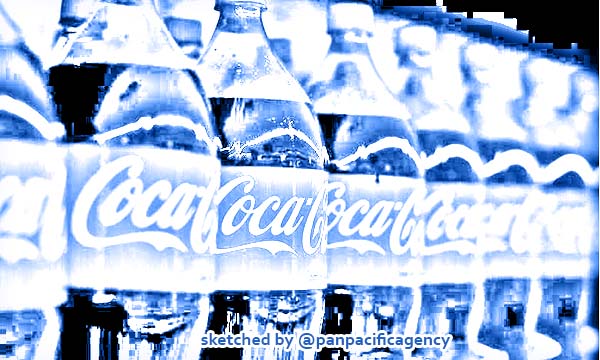Indonesia’s govt proposes excise tax on sugary drinks

Coca-Cola products on display at a store. Photo by Reuters/Mike Blake. Sketched by the Pan Pacific Agency.
JAKARTA, Feb 20, 2020, ANTARA. Government has proposed Rp1,500 to Rp2,500 excise tax on each liter of sugary drinks, to offset the growing number of diabetes cases which has started to affect teenagers as young as 15. “Many countries have imposed an excise tax on harmful products, including sugary drinks,” Finance Minister Sri Mulyani Indrawati said in a working meeting with Commission XI of the House of Representatives here Wednesday, ANTARA reported.
“We all know that diabetes is one disease with the highest growth, especially with the increased public income. Maybe this has contributed to the high cost for the BPJS (Insurance and Social Security) for Health,” Indrawati said.
An excise tax of Rp1,500 per liter would be imposed for packed tea with production currently reaching 2,191 million liters per year. The policy is expected to reduce production to 2,015 million liters per year and there will be a potential state revenue at Rp2.7 trillion.
An excise tax of Rp2,500 per liter will be imposed on carbonated drinks with production reaching 747 million liters per year. The imposition of the excise tax is expected to reduce production to 687 million liters per year with potential state revenue of Rp1.7 trillion.
The same amount of excise tax will be imposed for other sugary drinks such as instant coffee, concentrated drinks, and energy drinks with production reaching 808 million liters per year.
“Products such as energy drinks and instant coffee in sachets with the production of 808 million liters per year. The imposition of (excise tax) of Rp2,500 per liter and elasticity of 0.8, the production is estimated to reach 743 million liters and potential state revenue to reach Rp1.85 trillion,” she elaborated.
If the proposal is approved by the parliament, it would increase the state revenue by Rp6.25 trillion, the minister said.
Products made and packed by non-fabricants, including small and medium enterprises, such as honey, sugar-free vegetable juices, and exported sugary drinks are not subject to the excise tax, she said.
“Subject of the excise tax is fabricant or domestic production and imported products,” she added.
Indrawati could not yet elaborate on the impact of the excise tax imposition for the inflation rate but projected that it might be bigger than the impact of excise tax imposition for plastic that may reach 0.045 percent.
Responding to the proposal, Commission XI of the House has called on the government to establish a detailed road map on the excise tax imposition.
The taxes successfully reduced consumption of sugary drinks and reduced adverse health consequences, according to a 2019 review of research on sugary drink taxes.
In general, the theory of supply and demand predicts that the effect of taxes is to raise the consumer price of goods and lower the quantity consumed. Whether the sugary drinks tax is imposed on the seller or consumer, in both cases the tax burden is shared between both.